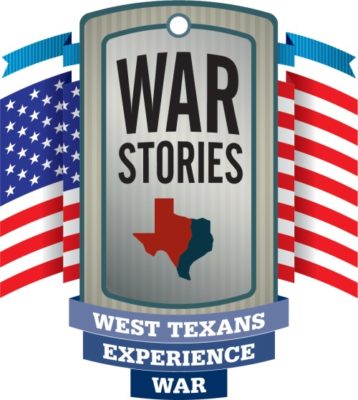War Stories, History Harvests, and how we learned to adapt on the fly
06 November 2018 – Christine Lamberson and Kanisorn Wongsrichanalai

Image credit: Angelo State University
War Stories is an NEH grant-funded project that preserves the experiences of West Texas U.S. military veterans and their family members by digitizing documents and objects as well as conducting oral history interviews. Housed in the Angelo State University history department, the project is a collaboration between faculty, students, and community members. Since the inception of War Stories in 2015, its co-directors, as well as student workers, have utilized the “History Harvest” model. Pioneered at the University of Nebraska, the model involves collecting community histories by inviting people to bring and discuss objects or documents to be digitized at public, day-long events.
The War Stories project team planned to work with a range of local partners as we traveled to West Texas towns to hold the “harvests.” Although History Harvest seemed ideal for working with a dispersed community of veterans, in the early stages the model did not work as well as we hoped, despite careful planning and outreach. After a few adaptations, however, we found a successful hybrid between the harvest model and a more traditional oral history approach that has worked for this veterans-focused project.
This project provides both a reminder of the need for flexibility on the part of public historians and an example of how to shape methodology to the specific communities involved with their projects. We concluded that the decentralization of the community, along with the fact we were requesting that participants share sometimes sensitive experiences with us required personalized introductions and more extensive, advanced conversations with potential participants. In other words, we found that the depth of outreach was more important than breadth.
Harvests require significant advertising and prep work. Our area—all of Texas west of the I-35 corridor—is large and our resources too thin to do that prep work in person. Our extensive outreach included press releases, posters, and contacts with local organizations to get the word out to veterans. During our first few harvests, this method produced wildly varying results. At one event, we sat idle most of the day but were overwhelmed with participants at another.
The reluctance of some veterans to share their experiences or objects presented another unanticipated challenge. We think this reluctance stemmed from two factors.
First, though History Harvest includes a subject-specific model—wherein the material collected focuses on a particular topic such as religion—the model has most commonly been used to collect material from a single geographic community. We have participated in such successful harvests that aimed to collect materials about a particular town’s history. Despite working mostly in small towns, we found that veterans within the area did not always have a sense of community. This meant that people did not attend the harvests in groups and were more reluctant to come at all.
Second, our topic—military experiences—covers fond memories for some, but not for all. We were requesting that individuals share personal, sometimes uncomfortable or even traumatic experiences. This means the actual process of being interviewed exacts a cost on participants, who often want to ensure their stories are taken care of and that the cost is worth the benefit. Furthermore, individuals often questioned whether their experience was actually “important.” Our discussions with hesitant potential participants during our first few harvests made clear that our outreach was not meeting its goals of providing enough information to potential participants to draw them to the harvest.
In response to these challenges, we made several adjustments. The project team shifted to a model similar to traditional oral history projects, with recruitment focused on word of mouth and introductions through partner organizations. The day-long History Harvest events for scanning and interviewing continued alongside this new outreach.
Our strongest local partnerships came from individuals who personally worked with veterans or in places with an existing sense of community among veterans. These personally connected partners have been more important than institutions or community leaders. Whether a veterans center or a local library with enthusiastic volunteers, these partners have been instrumental in encouraging individuals to share their stories. As with traditional oral history work, they lend legitimacy to our project and facilitate personal introductions.
The project team also encourages individuals to make appointments in advance, which helps us match our staffing levels to the level of participation and cuts down on wait time. Second, and most important, the appointment process encourages those who are curious but unsure to make contact early. We’ve created new and more extensive materials of frequently asked questions and sample entries to show potential participants what we are looking for and what will happen to their materials in advance.
Combining the individualized introductions of oral history methodology with the History Harvest model has enabled us to preserve valuable histories across rural West Texas. As many oral historians know, asking groups to share personal, sensitive experiences with historians requires extensive, personalized outreach. We hope our experience highlights one way to be successful in preserving these types of stories in a rural area. In addition, our experience reiterates that the History Harvest model is incredibly adaptable and can be adjusted to fit with a variety of projects as long as practitioners are willing to customize the model to their community’s needs.
~ Christine Lamberson and Kanisorn Wongscrichanalai are co-directors of the War Stories Project and associate professors of history at Angelo State University. In January, Wongsrichanalai will become director of research at the Massachusetts Historical Society.



